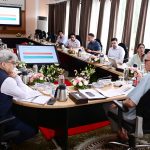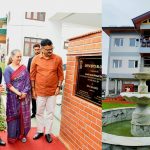There exists a disheartening truth about the ignorance and stigma about menstrual hygiene education. Despite living in the 21st century, the lack of awareness about this important topic is still considered a taboo in our society which makes it hard to teach and support people, especially young girls and women about menstrual health and education.
Menstruation is a normal natural biological process. When girls grow up, their bodies go through a natural process called menstruation. During this blood comes out from their uterus and goes out through the vagina. It usually starts around the age of 11 to 14 years old, and continues until they’re in their 40s.
“Menstruation is a significant milestone in a girl’s development. It means your body is starting its reproductive phase. It’s totally normal and nothing to feel embarrassed about. It’s important for society in general and young girls in particular to understand that it is a normal bodily function and not something to be ashamed of or embarrassed about. Proper education and support are crucial during this time to ensure girls feel confident and empowered in managing their menstrual health.” Said an Asha worker
Every year, 28th of May is observed as World Menstrual Hygiene Day in order to raise awareness among masses about the importance of menstrual health and hygiene. It was first observed in the year 2014 by German-based NGO ‘WASH- United’. They picked May 28th for a specific reason, as on an average, women and girls have their periods for about 5 days each month, and the typical menstrual cycle lasts around 28 days. The World Bank emphasizes the critical importance of Menstrual Health and Hygiene (MHH) in enhancing the well-being and empowerment of women and adolescent girls. According to the World Bank, on any given day, more than 300 million women worldwide experience menstruation. However, despite this significant number, approximately 500 million women lack access to menstrual products and proper facilities for managing menstrual hygiene. Moreover, a 2022 report conducted by UNICEF revealed that 71 per cent of teenage girls in India are not informed about menstruation until they experience their initial period.
In Kashmir valley there also exists a silent battle that prevails among the lives of many young girls and women that touches their lives every month. The silence around the subject accompanied with myths, leave young girls unsure about navigating their daily lives during the menstrual cycle. It not only leaves them vulnerable to menstrual health challenges and often has to deal with unfair treatment, teasing, and feeling left out. It’s because of old-fashioned beliefs, cultural rules, and not having enough education about this crucial topic particularly among boys.
Because nobody talks about periods and there are lots of narratives that unfold within which needs our immediate attention both at the individual and at the society level. Since this is a natural bodily function but due to the lack of openly discussion & education many girls either don’t have the necessary information about this or at times do not have access to the urgent facilities they need to manage and maintain a healthy period at education institutions.
Sharing her experiences about the subject, Zehra (name changed) a University of Kashmir student said “In our education system, a glaring gap exists as schools, both rural and urban, lack the sensitivity to engage in conversations about periods. This deficiency persists even at the college and university levels, where the absence of pad vending machines and clean washrooms underscores the neglect of women’s health. It’s disheartening that in environments meant for enlightenment, basic needs like menstrual hygiene are disregarded”
According to a study called the National Family Health Survey (NFHS), around 60 percent of women in the Kashmir region use cloth for periods. The survey also found that in northern India, Jammu and Kashmir has the lowest number of women (only 74.5 percent) using ‘clean methods’ for period protection. To address this, the government of Jammu and Kashmir started a program called the Menstrual Hygiene Scheme in 2016 as part of its National Health Mission. The initiative aims to distribute sanitary essentials to girls and young women and ensure they have access to necessary supplies for a healthy life.
Saima Bashir , a menstrual health advocate, emphasized the need for a comprehensive education plan, saying, “We must break the silence surrounding menstruation and provide accurate information to both girls and boys from a young age. This will not only promote better hygiene practices but also foster a culture of understanding and acceptance.”
In some communities, traditional beliefs and practices continue to dictate menstrual behaviors, which further marginalize those in need of support and education. Such attitudes perpetuate a cycle of misinformation and discrimination, ultimately affecting the overall well-being of individuals and communities.
Dr. Omar Bashir, a public health expert stressed the importance of collaborative efforts, stating, “Addressing the stigma surrounding menstruation requires a multi-faceted approach involving governments, healthcare providers, educators, and community leaders. By working together, we can create a more inclusive and supportive environment for menstrual health education.”
Efforts to address this issue are underway globally, with organizations and initiatives working to promote menstrual health education and eradicate stigma. However,progress has been slow, and many challenges remain, including limited access to resources and cultural resistance to change.
“As teachers, it’s really important to make menstruation education interesting and accessible for everyone and there needs to be a lot of sensitization. We don’t have any formal order to make menstrual health facilities available at colleges. But we’re tirelessly working at our own capacity to ensure each and every essential resource are accessible, empowering every girl student to comfortably seek assistance when needed” said a teacher of a government school who wishes to be anonymous.
As we strive for progress and equality in today’s modern society, it is also imperative to prioritize menstrual hygiene education and challenge the stigma that surrounds it. Only through collective action and awareness can we ensure that everyone has access to the knowledge and resources needed to manage their menstrual health with dignity and confidence.
Syed Uzma Hamid, a social work student and Curator at Srinagar Hub of Global Shapers Community shares the concern of many, by navigating the challenges of managing sanitary needs. Her own menstrual journey has fueled this commitment to addressing the issue, by targeting the broader struggle of young girls in Kashmir. “Recognizing menstruation as a core issue, my project “Dont Whisper. Embracing Monthly Rhythm” on menstrual education in Srinagar Hub, aims to educate adolescent girls. We partnered with Menstrupedia to provide knowledge through an exclusive comic book. Our mission is to empower young girls with information on their changing bodies, promote hygiene practices, debunk myths, and establish safe spaces for open conversations within educational institutions. Having conducted two successful workshops, covering 100 students before the winter break, our goal is to reach 500 students by April and, in the long run, have menstrual educators in every district, reaching 5,000 adolescent girls by the end of 2025.”
Although there are many challenges, things are looking up because more people are talking about menstrual hygiene in India. This is important because our society often keeps quiet about periods due to old-fashioned beliefs. Efforts like the Great WASH Yatra, books like Menstrupedia, and campaigns like Code Red that are helping to break the silence. People all over the world are working hard to change how we think, speak and act about periods.
In Kashmir, where traditions and norms often influence how people view menstruation, there’s an opportunity for change. By embracing efforts like these to promote menstrual hygiene, Kashmir can lead the way in breaking down taboos and ensuring that all individuals have access to proper education and resources for managing their periods. Through open conversations, media coverage and community support, people can contribute to a brighter, more inclusive future for girls and women regarding menstrual health.
Writer is intern with Rising Kashmir








